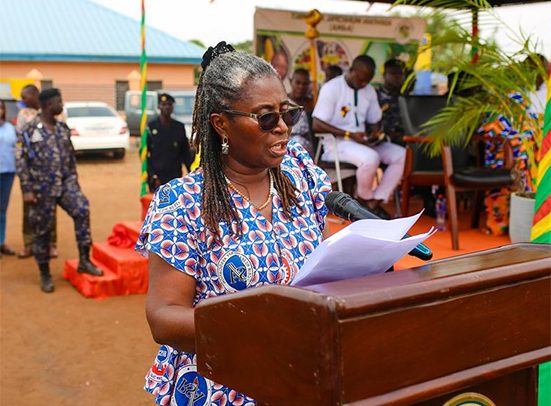Doris Yaa Osei
Dr. Doris Yaa Osei, the Acting Deputy Director of the Council for Scientific and Industrial Research’s (CSIR) Animal Research Institute, has raised a red flag over a looming climate change emergency and suggested ways of addressing it.
This, she said, constitutes a threat to agriculture and food security. She was speaking during this year’s Adentan Municipal Assembly’s chapter of the National Farmers’ Day celebration at Adentan, Accra on the theme “Building Climate Resilient Agriculture For Sustainable Food Security”.
Agriculture, she noted, “is in the midst of threat due to climate change, such as the increasingly unpredictable rainfall patterns experienced in recent years, which acts as a critical challenge for food security, availability of natural resources and livelihoods of our people.”
In this challenging reality, she went on, “crop production will be affected negatively, and livestock feed resources and water will be vulnerable, and bush fires could be an influential hazard in the communities.”
To respond to the foregone, she suggested the use of drought-tolerant crops, climate smart animal-agriculture practices, water-efficient irrigation systems, and appropriate farming techniques. These, she said, will have farmers reduce crop and livestock losses and sustain agricultural output despite the changing climate patterns.
A study done recently in the Kwahu Afram Plains by a team of animal scientists, led by Dr. Kwame Oppong-Anane, a former Director of Animal Production Directorate of the Ministry of Food and Agriculture, she recalled, “showed that climate change effects have worsened progressively over the last 30 years, and is expected to increase in severity in the future if nothing is done by way of policy intervention, change of people’s attitudes, and adoption of climate-smart technologies. The finding is likely to apply also to our municipality.”
Dr. Doris Yaa Osei called for a “national awareness on the causes of climate change and mitigation options vigorously undertaken by the relevant state institutions and non-governmental organisations to achieve a slowdown and possibly curtailing the climate change effects on agriculture in the country.”
She called on her compatriots to work harder to produce more food and meat to meet the nation’s requirement so as to cut down on the huge amount of money spent on the importation of the items.
She recalled how in 2022, “the country had to import a total of 288,944 MT of meat, comprising poultry, pork, cattle, sheep and goats, at a cost of 3,126 million Ghana Cedis, equivalent to 563 million US Dollars at the time.”
Agriculture, she said, is an important part of the country’s economy, accounting for over a third of its GDP, and employing more than half of the nation’s workforce and in which she said, “Government of Ghana has invested heavily with the aim of increasing production and the incomes of farmers, in particular the smallholder farmers.”
By A.R. Gomda


